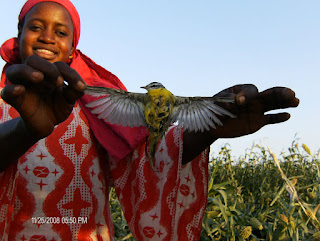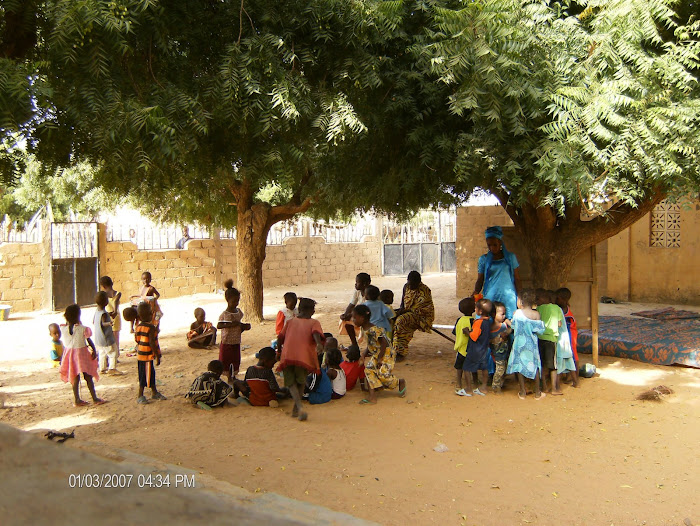When I first got to Tokomadji my host mom Penda would take me to the fields to show me how they "weed" the fields, we'd work together with her two sons (Mama, 21 and Demba, 12), and it was a good learning, bonding, working experience for me. I had to learn how to distinguish between the grassy weeds and the tiny shoots of millet that look pretty much identical to the weeds, and how to recognize bean leaves--then not kill them. It was great! Then about two weeks into it we're out in the field when Penda turns to me, earlier than usual, and says, "Lets go home, I'm tired." I told her that I wasn't tired so if she wanted to go home, go and I'll stay to finish the parcel that was left. She said she didn't want to leave me, so we both stayed until it was done.

That night, after spending the afternoon puking and feverish, she was officially diagnosed with malaria. The next day, not knowing what to do with myself, I went to the field and kept weeding. For 10 days I was the only one to go to our millet field (Mama and Demba, both still considered children in this society--and act like it--didn't go because their mom didn't tell them to). Of course what took me 10 days would have taken any experienced person about 2 or 3, but at least I was kept busy!
From then on, Penda's been referring to it as "Jenaba's field" (that's my local name! say it: Jen-uh-buh or Jenna-ba). After not going to the field for a while (the Muslim holiday Julde, I went to Kaedi, had an ear infection), I came back to find the little ankle-height shoots taller than me! I was totally lost in the cooperative's fields and couldn't find "my" field: Penda had to show me where my babies were!
Just when I thought I had seen it all, it came time to water my little ones. Oh, my gosh, what a job! A rusty water pump on the Senegal River is heard throughout the whole village as it pushes tons of water up the river's bank (about 25 feet) in huge pipes to the canal system so it can flow into each man's field.
(Yes, I said each man's field: only men are allowed to own a field in the village's cooperative. We have three fields: Penda's deceased husband's, her uncle's, and her father's. None of which are next to each other). Watering goes by sections; within each section each person allows the water to go past their field and those furthest from the pump open the small door to their field to let the water in. Once their field is thoroughly flooded, they close their door, stopping the flow to the field, and the next person opens the small door to their field, and so on until all people in a given section of the cooperative have watered/flooded their field.

It takes all morning: watching for leaks in the sand-and-mud divisions between people's fields, faulty doorways, breaks in the canals, people going out of turn, people not paying but still watering, and anything you can imagine that could go wrong! The fun part is taking off your flip flops, hiking up your skirt, and going nearly knee-deep (on me, I'm short) in the mud and water, back and forth the entire length of the field as you check for possible problems, leaks, etc. Ideally, we water once every 20 days or so (which, from an agricultural point of view, is NOT ideal).

Hey, people like millet, right? So do the birds! We had a 3-4 week battle with the birds as they would come and attack the fields and we would defend them by throwing rocks at the little buzzards and yell at them our war cries (literally we yell--birds don't like loud noises!). Again, poor Penda got malaria and I was the only one to come to our field's rescue (this time all of the kids were at school, learning. How can I argue with that!?) I quickly learned the rightways to yell at the different kinds of birds, how to use the "sling shot" (two arm-lengthed ropes connected with a palm-sized piece of cloth where the rock sits. You wind up over head like a lasso cowboy-style, then at just the right spot you let go of one side of rope, sending the rock into the millet, scaring the birds away). Also, the best looking millet got nifty outfits: they were wrapped in cloths to keep the birds out.

Yelling became my favorite part: my friend Djeewo (Say it: je-woah) and I were the youngest out there (only middle-aged women and grandmas came out). We would yell all kinds of greetings in all kinds of languages, sing, yell, dance, shout, and just have a great time even though there were about 2 fields between our own and most of the time we couldn't even see each other!

It was a sad day when Djeewo and I couldn't dance and sing at each other in languages the other didn't understand, but that day came: we harvested. You keep a long, toothed, curved, handled knife in the right hand, grab the head of millet in the left, and chop it off. We'd chop, throw it on the ground in piles, then later collect with huge sacks, and send them by horse and cart to our house. Now the millet is sitting on top of a storage room, drying out, waiting to be stored for eating or local selling later, or shipped to Kaedi to be sold in the market.
Any foods we don't grow in our fields or gardens is bought in the market with the money made from our fields. For lunch we eat rice (or lachiri, a grain derived from the millet we harvest!) with fish (one is 70UM Ouguiya, say it: oo-gee-yuh; we usually have 2 fish for 6-10 people) and veggies. If they're bought in the market it's about 200UM worth of veggeis: 1 or 2 small eggplants, 3/4 cups of tomato paste, 1 cup of Mauritanian pumpkin, 1 cup of Mauritanian cucumber, 1 cup of sweet potato, 5 small okras, a small chili pepper, and 2 onions.
Right now we also have in our field/garden space: pumpkin, cucumber, sweet potato, okra, and a thing we call folere (say it: fol-le-re, pretend its a word in Spanish, and there you go!). I have no idea what this is in the States!
Finally, my field is being harvested down to the roots so that our 8 goats and their 10 kids can eat the leaves and the 2 calves can eat the stalks. Nothing goes to waste!
P.S. When we keep the birds out of the fields, its an all day thing: we go there 7am, lunch is brought to us, we nap, do laundry, bathe, brush our teeth, make tea, chat, and work until sunset around 6pm.








